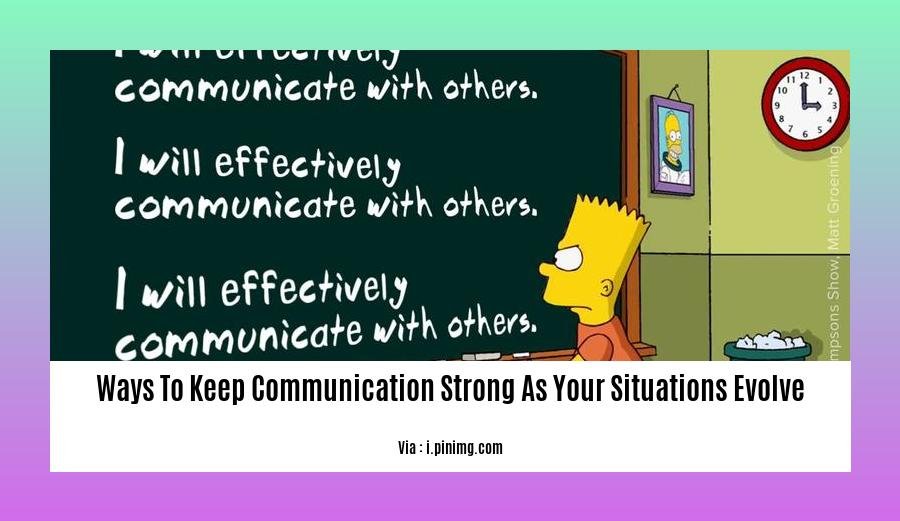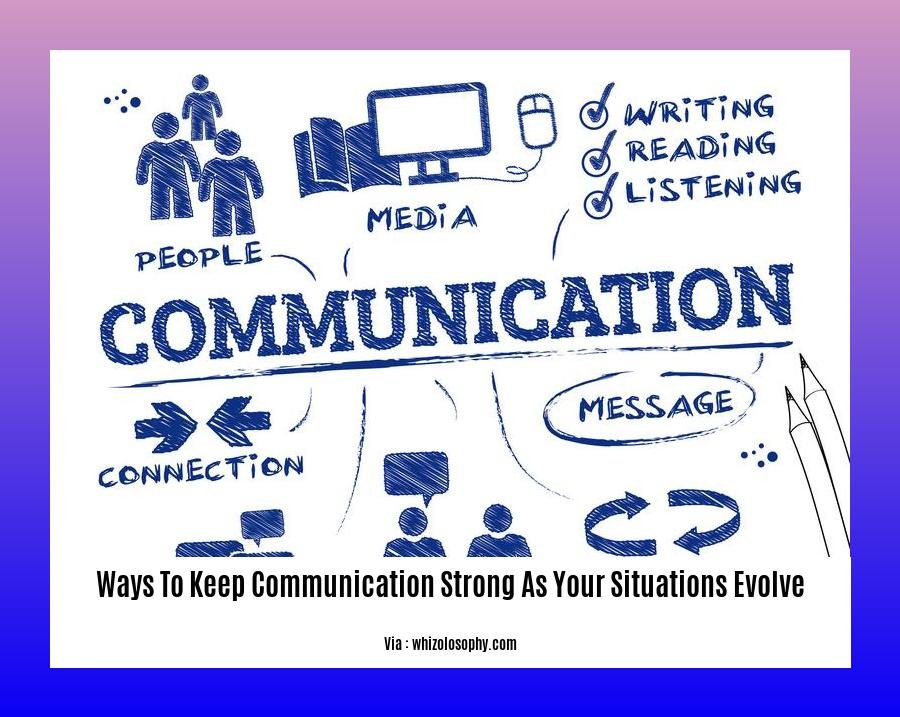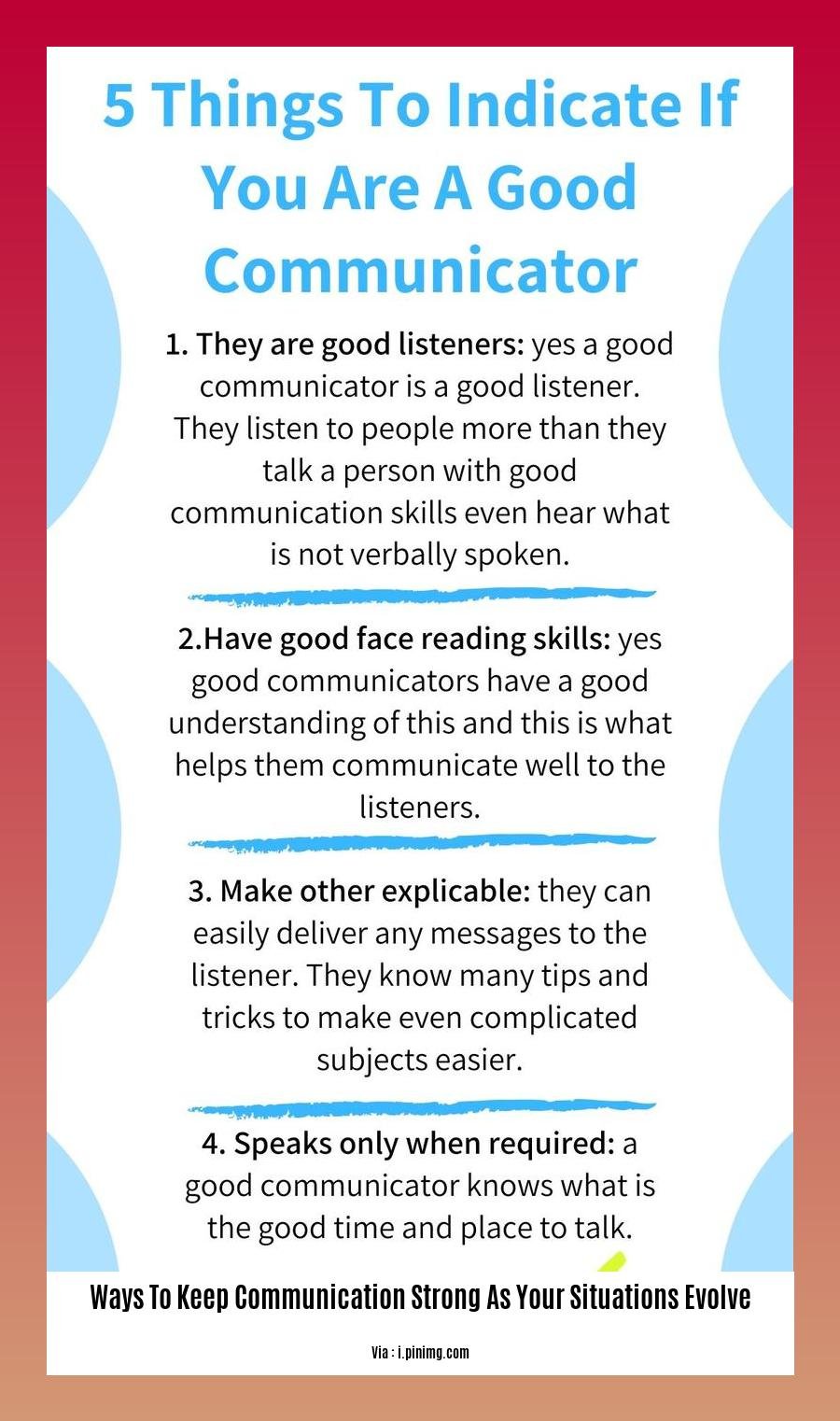In an ever-changing world, it’s essential to maintain strong communication as situations evolve. Effective communication is the backbone of successful relationships and collaboration. But how do you keep lines of communication open and flowing when circumstances change? Here are 4 Ways to Keep Communication Strong as Your Situations Evolve:

Key Takeaways:
- Engage in various communication scenarios to gain practical experience.
- Seek feedback to improve your communication skills.
- Communicate clearly and concisely.
- Record and analyze your communications to identify areas for growth.
- Practice active listening and ask clarifying questions.
- Avoid making assumptions and seek clarification.
- Cultivate self-awareness to manage emotions in challenging conversations.
- When addressing issues, avoid accusatory language and focus on constructive dialogue.
Ways to Keep Communication Strong as Your Situations Evolve
Communicating effectively requires effort and adaptability, especially when circumstances change. Implementing these strategies can keep communication strong as your situations evolve:
1. Communicate Regularly and Routinely:
Establish dedicated time for open and honest conversations, allowing both parties to share thoughts, feelings, and updates.
2. Prioritize Active Listening:
When engaged in dialogue, practice genuine listening. Ask clarifying questions, demonstrate interest, and avoid interrupting to foster understanding.
3. Embrace Flexibility and Adaptability:
Recognize the dynamic nature of situations and adjust communication styles as needed. Being agile in approach helps maintain effective exchange.
4. Foster a Culture of Respect:
Maintain respectful and considerate communication, even in disagreements. Use non-accusatory language and focus on constructive dialogue to resolve issues.
Love and relationships constantly change and evolve. Learn how to communicate more effectively in different stages of relationships by communicating through different life stages in relationships.
Be a collaborative team by discussing changing needs and roles as you progress through life.
Adapting communication styles over time is crucial; tips for adapting communication styles over time can help you stay connected.
Be a good listener
Key Takeaways:
- Emphasize nonverbal communication for attentiveness.
- Demonstrate active listening to show comprehension.
- Suspend judgment to understand the speaker’s perspective.
- Cultivate empathy for emotional understanding.
- Practice patience for uninterrupted listening.
- Embrace acceptance for respectful dialogue.
- Boost self-esteem for confidence in communication.
- Challenge nervousness for continuous improvement.
- Expand your horizons for diverse perspectives.
Listening effectively is a skill that fosters strong communication during evolving situations. By becoming a better listener, you can enhance your ability to build relationships, resolve conflicts, and effectively navigate changing circumstances.
Be respectful
To ensure your conversations and interactions remain respectful and productive, it’s essential to actively practice politeness, courtesy, and kindness. Here are a few tips to foster a respectful communication style:
- Treat others the way you want to be treated. Simple manners go a long way in creating a positive and respectful atmosphere.
- Respect everyone’s time. Be punctual for appointments and meetings, and avoid interrupting others when they’re speaking.
- Be mindful of your body language. Nonverbal cues can convey a lot about your attitude. Make sure yours are respectful and approachable.
- Choose your words carefully. Avoid using hurtful or offensive language, and be mindful of the tone of your voice.
- Listen actively. Give the person you’re talking to your full attention. Ask questions to show that you’re engaged, and summarize what they’ve said to ensure understanding.
Remember, respect is a two-way street. By being respectful in your communication, you’re not only showing consideration for others, but also creating a positive and productive environment for everyone involved.
Key Takeaways:
- Practice politeness, courtesy, and kindness in all interactions.
- Respect others’ time and avoid interrupting.
- Be mindful of body language and use it to convey respect.
- Choose words carefully and use a respectful tone.
- Listen actively and show engagement.
Source:
- Respect in Communication: Skill that Brings People Together
Be willing to compromise
Communication is a vital part of any relationship, but it can be especially challenging when your situations are constantly evolving. Whether you’re dealing with a new job, a new baby, or a new city, it’s important to find ways to keep the lines of communication open and honest.
One of the most important things you can do to keep communication strong is to be willing to compromise. This doesn’t mean giving up on what you want, but it does mean finding a solution that works for both of you.
Here are a few tips for compromising effectively:
- Identify your needs. What are your priorities? What are you willing to give up?
- Listen to your partner’s needs. What are their priorities? What are they willing to give up?
- Be open to different solutions. There may be more than one way to solve a problem. Be willing to explore all of your options.
- Be willing to negotiate. Don’t be afraid to give and take. The goal is to find a solution that works for both of you.
Compromising can be difficult, but it’s essential for fostering healthy relationships. By being willing to compromise, you’re showing that you value your partner’s needs and that you’re committed to working together to find solutions that work for both of you.
Key Takeaways:
- Set aside regular time to talk.
- Be honest and open.
- Be a good listener.
- Be respectful.
- Be willing to compromise.
Most Relevant URL Source:











